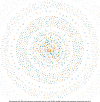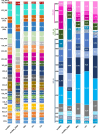Cohort profile: Copenhagen Hospital Biobank-chronic inflammatory disease-inflammatory bowel disease (CHB-CID:IBD) genetic cohort
- PMID: 40488802
- PMCID: PMC12263709
- DOI: 10.1007/s10654-025-01239-4
Cohort profile: Copenhagen Hospital Biobank-chronic inflammatory disease-inflammatory bowel disease (CHB-CID:IBD) genetic cohort
Abstract
The Copenhagen Hospital Biobank-chronic inflammatory disease-inflammatory bowel disease (CHB-CID: IBD) cohort contributes to genetic research in inflammatory bowel disease, including Crohn's disease and ulcerative colitis. Of the 327,084 enrolled and genotyped individuals in the cohort, 10,626 have been diagnosed with IBD as of May 2023. The CHB-CID: IBD cohort includes both patients without IBD and healthy blood donors as control groups. Clinical data is collected from Danish registries and patient records, including details on hospital contacts, co-morbidities, medication, surgical procedures, and laboratory investigations. The cohort features a wide age range (> 18 years), extensive population coverage representative of Danish adults, and validated IBD diagnoses. Finally, the cohort benefits from continuous recruitment and regular updates of clinical information. The aim is to enhance IBD management and ultimately improve patients' quality of life.
Keywords: Crohn’s disease; Faecal Calprotectin; Genetic cohort; Genetic relatedness; Inflammatory bowel disease; Ulcerative colitis.
© 2025. The Author(s).
Conflict of interest statement
Declarations. Conflict of interest: All personal fees and grants were received outside this work. Anja Poulsen reports research grants and personal fees from Janssen, Takeda, and MSD, personal fees from Bristol Myers Squibb, national coordinator of studies from Agomab, Boehringer Ingelheim and Bristol Myers. Bente Glintborg has received research grants (paid to institution) from AbbVie, Pfizer, BMS, Sandoz. Bente Glintborg chairs the DANBIO steering committee. Jacob Broder Brodersen has received consultation fee from Jansen-Cilag. Johan Burisch reports grants and personal fees from AbbVie, Janssen-Cilag, Takeda, Tillots Pharma, Bristol Myers Squibb, and MSD, personal fees from Celgene, Pfizer, Samsung Bioepis, Pharmacosmos, Ferring, Galapagos, and Eli Lilly, and grants from Novo Nordisk Foundation. Mette Julsgaard has received research grants from Takeda and the Novo Nordisk Foundation (grant no. NNF23OC0081717), has been on the advisory board of PharmaCosmos, has received consultation fee from Ferring and Takeda, and has received speaker’s fees from Tillotts Pharma, MSD, Ferring, and Takeda. Vibeke A ndersen has served as advisory board member for MSD (Merck). Søren Brunak has ownerships in Intomics A/S, Hoba Therapeutics Aps, Novo Nordisk A/S, Lundbeck A/S, ALK abello A/S, Eli Lilly and Co and managing board memberships in Proscion A/S and Intomics A/S. Thorsten Brodersen’s spouse currently holds incentive stock options in LEO Pharma A/S. All other authors declare no conflict of interest. Ethical approval: CHB-CID:IBD studies will be conducted in accordance with the Declaration of Helsinki and has been approved by the National and the Capital, Central Denmark, and South Denmark Regional Committees on Health Research Ethics (NVK-1700407, H-18064178, M20100153, S-20120113, and S-20160124), as well as the Data Protection Agency of Capital (P-2019–99 and P-2022–876), Central (RM: J. 2010–41-4719) and Southern (RSD: 2008–58-035) Denmark. All individuals in CHB have been informed about their inclusion into the biobank and the use of their data for research. Concent for publication: ChatGPT ( https://chat.openai.com/ ) assisted copy editing was used and authors reviewed and revised the final version, taking full responsibility for the content of the publication.
Figures




References
-
- Alatab S, Sepanlou SG, Ikuta K, Vahedi H, Bisignano C, Safiri S, et al. The global, regional, and national burden of inflammatory bowel disease in 195 countries and territories, 1990–2017: a systematic analysis for the global burden of disease study 2017. Lancet Gastroenterol Hepatol. 2020;5:17–30. - PMC - PubMed
-
- Ng SC, Shi HY, Hamidi N, Underwood FE, Tang W, Benchimol EI, et al. Worldwide incidence and prevalence of inflammatory bowel disease in the 21st century: a systematic review of population-based studies. Lancet. 2017;390:2769–78. - PubMed
-
- Moller FT, Andersen V, Wohlfahrt J, Jess T. Familial risk of inflammatory bowel disease: a population-based cohort study 1977–2011. Am J Gastroenterol. 2015;110:564–71. - PubMed
MeSH terms
Grants and funding
LinkOut - more resources
Full Text Sources
Medical

